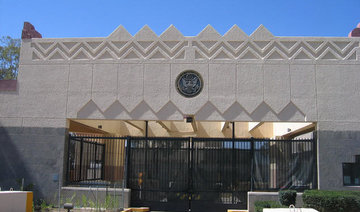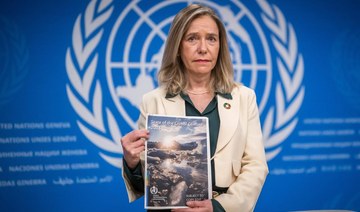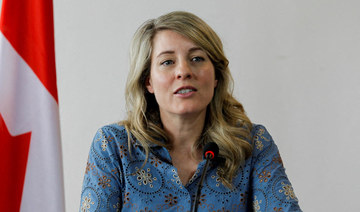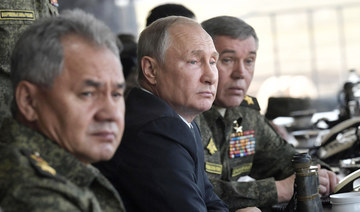NEW YORK: Disgraced R&B superstar R. Kelly was sentenced Wednesday to 30 years in prison for using his fame to sexually abuse young fans, including some who were just children, in a systematic scheme that went on for decades.
Through tears and anger, several of Kelly’s accusers told a court in New York City, and the singer himself, that he had misled and preyed upon them.
“You made me do things that broke my spirit. I literally wished I would die because of how low you made me feel,” said one unnamed survivor, directly addressing Kelly, who kept his hands folded and his eyes downcast.
“Do you remember that?” she asked.
Kelly, 55, didn’t give a statement and showed no reaction on hearing his penalty, which also included a $100,000 fine. He has denied wrongdoing, and he plans to appeal his conviction.
The Grammy-winning, multiplatinum-selling songwriter was found guilty last year of racketeering and sex trafficking at a trial that gave voice to accusers who had previously wondered if their stories were being ignored because they were Black women.
Victims “are no longer the preyed-on individuals we once were,” another one of his accusers said at the sentencing.
“There wasn’t a day in my life, up until this moment, that I actually believed that the judicial system would come through for Black and brown girls,” she added outside court.
A third woman, sobbing and sniffling as she addressed the court, also said Kelly’s conviction renewed her faith in the legal system.
The woman said Kelly victimized her after she went to a concert when she was 17.
“I was afraid, naive and didn’t know how to handle the situation,” she said, so she didn’t speak up at the time.
“Silence,” she said, “is a very lonely place.”
Kelly’s lawyer, Jennifer Bonjean, said he was “devastated” by the sentence and saddened by what he had heard.
“He’s a human being. He feels what other people are feeling. But that doesn’t mean that he can accept responsibility in the way that the government would like him to and other people would like him to. Because he disagrees with the characterizations that have been made about him,” she said.
The sentence caps a slow-motion fall for Kelly, who is known for work including the 1996 hit “I Believe I Can Fly” and the cult classic “Trapped in the Closet,” a multipart tale of sexual betrayal and intrigue.
He was adored by legions of fans and sold millions of albums even after allegations about his abuse of young girls began circulating publicly in the 1990s. He beat child pornography charges in Chicago in 2008, when a jury acquitted him.
Widespread outrage over Kelly’s sexual misconduct didn’t emerge until the #MeToo reckoning, reaching a crescendo after the release of the documentary “Surviving R. Kelly.”
“I hope this sentencing serves as its own testimony that it doesn’t matter how powerful, rich or famous your abuser may be or how small they make you feel — justice only hears the truth,” Brooklyn US Attorney Breon Peace said Wednesday.
A Brooklyn federal court jury convicted the singer, born Robert Sylvester Kelly, after hearing that he used his entourage of managers and aides to meet girls and keep them obedient, an operation that prosecutors said amounted to a criminal enterprise.
Several accusers testified that Kelly subjected them to perverse and sadistic whims when they were underage.
The accusers alleged they were ordered to sign nondisclosure forms and were subjected to threats and punishments such as violent spankings if they broke what one referred to as “Rob’s rules.”
Some said they believed the videotapes he shot of them having sex would be used against them if they exposed what was happening.
According to testimony, Kelly gave several accusers herpes without disclosing he had an STD, coerced a teenage boy to join him for sex with a naked girl who emerged from underneath a boxing ring in his garage, and shot a shaming video that showed one victim smearing feces on her face as punishment for breaking his rules.
“The horrors your victims endured,” US District Judge Ann Donnelly said as she sentenced him. “No price was too high to pay for your happiness.”
Lizzette Martinez was a 17-year-old aspiring singer when she met Kelly at a Florida mall. She was promised mentorship but quickly ended up “a sex slave,” she said Wednesday outside court.
Asked whether Kelly’s 30-year sentence was sufficient punishment, she paused before answering.
“I, personally, don’t think it’s enough,” she said, “but I’m pleased with it.”
At the trial, evidence also was presented about a fraudulent marriage scheme hatched to protect Kelly after he feared he had impregnated R&B phenom Aaliyah in 1994 when she was just 15. Witnesses said they were married in matching jogging suits using a license falsely listing her age as 18; he was 27 at the time.
Aaliyah worked with Kelly, who wrote and produced her 1994 debut album, “Age Ain’t Nothing But A Number.” She died in a plane crash in 2001 at age 22.
Kelly didn’t testify at his trial, but his then-lawyers portrayed his accusers as girlfriends and groupies who weren’t forced to do anything against their will and stayed with him because they enjoyed the perks of his lifestyle.
His current lawyers had argued he should get no more than 10 years in prison because he had a traumatic childhood “involving severe, prolonged childhood sexual abuse, poverty, and violence.”
As an adult with “literacy deficiencies,” the star was “repeatedly defrauded and financially abused, often by the people he paid to protect him,” his lawyers said.
The Associated Press does not name people who say they have been sexually assaulted or abused, unless they come forward publicly, as Martinez has. Several women who spoke at Kelly’s sentencing were identified only by first names or pseudonyms.
Kelly has been jailed without bail since in 2019. He still faces child pornography and obstruction-of-justice charges in Chicago, where a trial is scheduled to begin Aug. 15.
R&B superstar R. Kelly sentenced to 30 years in sex trafficking case
https://arab.news/jk2d8
R&B superstar R. Kelly sentenced to 30 years in sex trafficking case
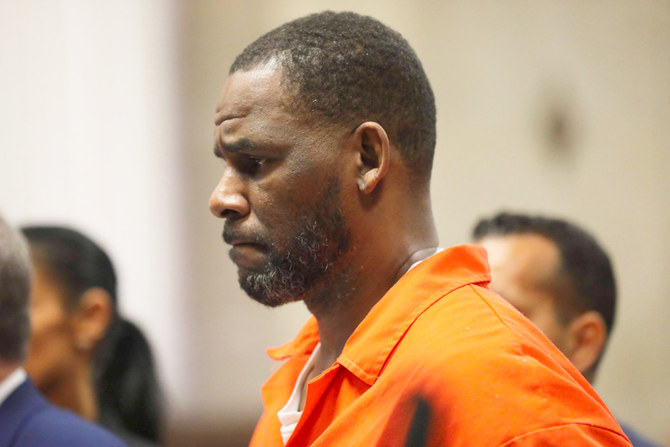
- Several accusers testified that Kelly subjected them to perverse and sadistic whims when they were underage
- Kelly was “devastated” by the sentence and saddened by what he had heard, says his lawyer, Jennifer Bonjean
- District Judge Ann Donnelly: “The horrors your victims endured. No price was too high to pay for your happiness.”
US Senate approves $95 billion aid bill to support Ukraine, Israel war effort

- Ukraine, who has been been on the back foot in its war against Russia, welcomed the vote
- Israel, which has killed more than 34,000 in Gaza, plans to attack Rafah to free hostages held by Hamas
WASHINGTON: A sweeping foreign aid package easily passed the US Congress late on Tuesday after months of delay, clearing the way for fresh Ukraine funding amid advances from Russia’s invasion force and Kyiv’s shortages of military supplies.
The Senate approved by 79 to 18 four bills passed by the House of Representatives on Saturday, after House Republican leaders abruptly switched course last week and allowed a vote on the $95 billion in mostly military aid for Ukraine, Israel and Taiwan and US partners in the Indo-Pacific.
The four bills were combined into one package in the Senate.

The largest provides $61 billion in critically needed funding for Ukraine; a second provides $26 billion for Israel and humanitarian aid for civilians in conflict zones around the world, and a third mandates $8.12 billion to “counter communist China” in the Indo-Pacific.
A fourth, which the House added to the package last week, includes a potential ban on the Chinese-controlled social media app TikTok, measures for the transfer of seized Russian assets to Ukraine and new sanctions on Iran.
Biden has promised to sign the measure into law as soon as it reaches his desk, and his administration is already preparing a $1 billion military aid package for Ukraine, the first to be sourced from the bill, two US officials told Reuters.
The Senate’s Democratic and Republican leaders predicted that Congress had turned the corner in putting Russian President Vladimir Putin and other foreign adversaries on notice that Washington will continue supporting Ukraine and other foreign partners.
“This is an inflection point in history. Western democracy perhaps faced its greatest threat since the end of the Cold War,” Democratic Majority Leader Chuck Schumer said in the Senate.
The aid package could be the last approved for Ukraine until after elections in November when the White House, House of Representatives and one-third of the Senate are up for grabs.
Much of the opposition to the security assistance in both the House and Senate has come from Republicans with close ties to former US President Donald Trump, a Ukraine aid skeptic who has stressed “America First” policies as he seeks a second term.
Senate Republican Leader Mitch McConnell, a strong advocate for assisting Ukraine, expressed regret about the delay, largely due to hard-line Republicans’ objections to adding more to the $113 billion Washington had authorized for Kyiv since Russia began its full-scale invasion in February 2022.
“I think we’ve turned the corner on the isolationist movement,” McConnell told a news conference.
Some of the Ukraine money — $10 billion in economic support — comes in the form of a loan, which Trump had suggested. But the bill lets the president forgive the loan starting in 2026.
HUMANITARIAN CONCERNS
The influx of weapons should improve Kyiv’s chances of averting a major breakthrough in the east by Russian invaders, although it would have been more helpful if the aid had come closer to when Biden requested it last year, analysts said.
It was not immediately clear how the money for Israel would affect the conflict in Gaza. Israel already receives billions of dollars in annual US security assistance, but it more recently has faced its first direct aerial attack by Iran.
Aid supporters hope the humanitarian assistance will help Palestinians in Gaza, which has been devastated by Israel’s campaign against Hamas to retaliate for Oct. 7 attacks that killed 1,200 people.
Gaza health authorities say the campaign has led to the deaths of more than 34,000 civilians in the Palestinian enclave.
It was the second time this year that the Democratic-led Senate passed security aid for Ukraine, Israel and the Indo-Pacific. The last bill, more than two months ago, garnered 70 percent support in the 100-member chamber from Republicans and Democrats. But leaders of the Republican-controlled House would not allow a vote on the foreign aid until last week.
The legislation’s progress has been closely watched by industry, with US defense firms up for major contracts to supply equipment for Ukraine and other US partners.
Experts expect the supplemental spending to boost the order backlog of RTX Corp. along with other major companies that receive government contracts, such as Lockheed Martin , General Dynamics and Northrop Grumman.
The House passed the Ukraine funding by 311-112, with all “no” votes coming from Republicans, many of whom were bitterly opposed to further assistance for Kyiv. Only 101 Republicans voted for it, forcing Speaker Mike Johnson to rely on Democratic support and prompting calls for his ouster as House leader.
However, the House left Washington for a week-long recess, without triggering a vote to remove Johnson.
NASA chief asks nations to work together on climate change
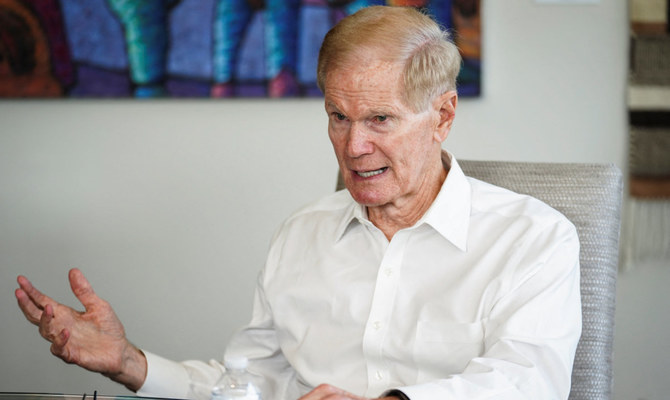
- Solutions to mitigate greenhouse gas emissions that rapidly warm the planet and drive the climate crisis already exist, but require unprecedented changes at a new scale and pace
MEXICO CITY: NASA is hoping that nations will work together more closely in the future on topics such as climate change, including greenhouse gas emissions, the space agency’s head, Bill Nelson, said on Tuesday.
Solutions to mitigate greenhouse gas emissions that rapidly warm the planet and drive the climate crisis already exist, but require unprecedented changes at a new scale and pace.
“This is something that nations can work on together because the information is there,” Nelson said in Mexico City when asked about how to address greenhouse gas emissions. “It’s important that we act on it.”
Satellites have emerged as powerful tools for scientists around the world to study climate change but also, increasingly, pinpoint the origin of greenhouse gas emissions, such as methane leaks, that would otherwise have gone undetected.
Nelson added that satellites were constantly collecting data about climate and NASA was looking to make this data accessible, and educate people on how to use it.
Methane, the main component of natural gas, is the second-largest contributor to global warming after carbon dioxide. Scientists can now pinpoint the origin of large methane leaks using data gathered by satellites.
It is a much more potent driver of global warming in the short term than carbon dioxide because it traps more heat in the atmosphere, ton for ton.
“The types of concerns that we have are global,” said NASA Deputy Administrator Pam Melroy. “It’s very important to recognize that not any one country can solve that problem alone.”
Earlier in the day, Nelson and Melroy, who are both astronauts, met with Mexican President Andres Manuel Lopez Obrador and lawmakers to discuss how the countries can work together.
Canadian police charge 2 former UN employees with conspiracy to sell military equipment in Libya

- Poirier said Mhaouek, a Canadian citizen, was arrested Tuesday morning at his home in the Montreal suburb of Ste-Catherine, Que., and was scheduled to appear in a Montreal court later in the day
MONTREAL: Two former United Nations employees in Montreal have been charged with participating in a conspiracy to sell Chinese-made drones and other military equipment in Libya, Canadian police said Tuesday.
RCMP spokesman Sgt. Charles Poirier said the alleged offenses occurred between 2018 and 2021, when the two men were working at the International Civil Aviation Organization, a UN agency headquartered in Montreal.
Police identified the two men as Fathi Ben Ahmed Mhaouek, 61, and Mahmud Mohamed Elsuwaye Sayeh, 37. Poirer said they violated UN sanctions related to the Libyan civil war. The sanctions have the force of law in Canada by way of federal regulation.
“What we found is that through some shell companies, they attempted to sell this Chinese military equipment to Libya, which is a direct violation of the regulation,” Poirier said, adding that the military equipment included large drones that can carry multiple missiles.
Poirier said the regulation prohibits anyone in Canada from supplying military equipment to any of the factions that were fighting in the Libyan civil war, or helping to finance those groups. The alleged conspiracy, he said, would have benefited one of the two main factions in the conflict, which ended in 2020.
“The second part of this scheme was to export Libyan oil to China,” Poirier said. “So at the time, the oil fields were under the control of Gen. Khalifa Haftar and the plan was to sell millions of drums of crude oil to China without anyone knowing about it.”
Haftar’s self-styled Libyan National Army fought against Libya’s UN-backed government and held much of the country’s east during the civil war; he continues to be a powerful figure in that region.
Poirier said Mhaouek, a Canadian citizen, was arrested Tuesday morning at his home in the Montreal suburb of Ste-Catherine, Que., and was scheduled to appear in a Montreal court later in the day.
Mhaouek’s alleged accomplice remains on the run. An Interpol red notice — an alert sent to police around the world — and a Canada-wide warrant have been issued for Sayeh’s arrest.
Poirier said investigators have no indication that military equipment or crude oil ever reached their alleged final destinations, but he said if they had, the two co-conspirators stood to gain several million dollars in commissions.
“The theory behind the motivation is primarily financial,” he said. However, it would have also benefited China by allowing it to covertly support Haftar’s faction and by giving the country prime access to Libyan oil.
Poirier said the investigation began in 2022 after the RCMP received what he described as “credible intelligence.”
Both men had diplomatic immunity due to their work with the UN Their immunity had to be waived by ICAO before the two men could be charged.
The UN organization, which sets international aviation standards, has been collaborating with the police investigation.
“There’s no indication that ICAO was aware of the conspiracy until they were approached by us,” Poirier said.
Police don’t know where Sayeh, a Libyan national, may be.
“He could be in Libya, but with the level of influence and the networking that these men had working at ICAO, he could be anywhere,” Poirier said.
The UN’s civil aviation agency said in an emailed statement that it is committed to upholding Canadian laws, UN standards and its own ethics code.
“ICAO is fully cooperating with the RCMP investigation of the individuals involved in the complaint, who left the organization a number of years ago,” the agency said. “ICAO strongly condemns any actions of individuals that are inconsistent with the organization’s values.”
Rights concerns, costs undermine Turkiye-EU migrant deal, say auditors
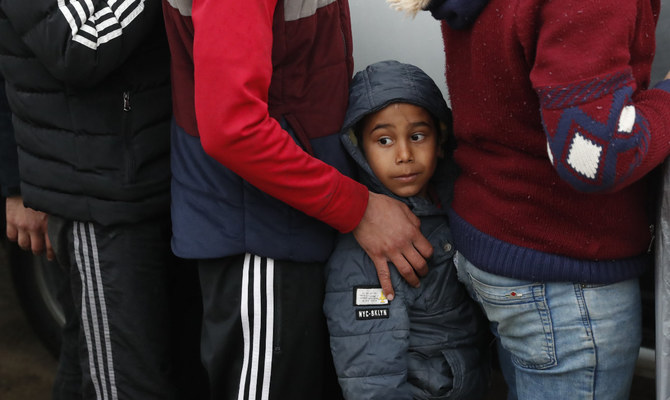
- EU Ombudsman Emily O’Reilly has launched an inquiry into human rights guarantees under the bloc’s new migration deal with Tunisia
BRUSSELS: Turkiye’s poor human rights record and economic factors are undermining the effectiveness of the European Union’s migration deal with Ankara, EU auditors said on Wednesday.
Under the 2016 deal, Ankara agreed to take back migrants who had crossed from its territory to Europe in return for EU aid to help fund more than four million refugees on Turkish soil.
The EU, which faces elections in June for the European Parliament in which illegal migration promises to be a big issue, has sealed agreements similar to the Turkiye scheme with Tunisia, Egypt, Mauritania and others.
In their report, the EU auditors raised concerns about the ability of non-governmental organizations (NGOs) to operate projects, as envisaged under the 6 billion euro ($6.4 billion) deal, given Turkiye’s authoritarian turn since a failed coup in 2016 and its crackdown on dissent.
“The operating situation of NGOs has continuously deteriorated since 2015 and has been exacerbated in the context of the unsuccessful... coup in Turkiye, where NGOs subsequently were targeted through various legislation,” it said.
The European Court of Auditors (ECA) report also cited the difficulty of managing the EU aid in the context of Turkiye’s economic downturn and Ankara’s “backsliding on the rule of law and fundamental rights.”
The report said the European Commission, the EU’s executive, had failed to provide an adequate analysis of costs and that it was unclear what would happen once the aid ended.
“The facility is beneficial for refugees and host communities but we would still like to see improvements in terms of demonstrating impact, ensuring sustainability, and value for money,” said Bettina Jakobsen, who led the ECA report.
Rights groups and some politicians have long accused the EU of neglecting human rights in its drive to curb illegal migration.
“This leads to the EU focusing less on issues that should be of relevance such as the neglect of human rights,” said Florian Trauner, a professor at the Brussels School of Governance.
EU Ombudsman Emily O’Reilly has launched an inquiry into human rights guarantees under the bloc’s new migration deal with Tunisia.
US, Russia set for a showdown at UN over nuclear weapons in space
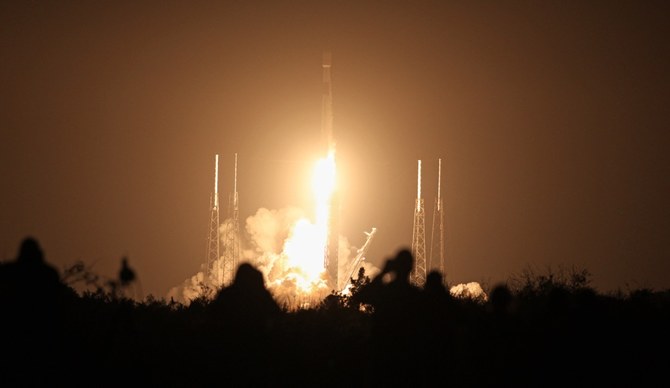
- The White House says Russia has not yet deployed such a weapon.
UNITED NATIONS/WASHINGTON: The United States and Russia are set to face off over nuclear weapons in space on Wednesday at the United Nations Security Council, which is due to vote on a US-drafted resolution calling on countries to prevent an arms race in outer space.
Russia is expected to block the draft resolution, said some diplomats. The US move comes after it accused Moscow of developing an anti-satellite nuclear weapon to put in space, an allegation that Russia’s defense minister has flatly denied.
US Ambassador to the UN Linda Thomas-Greenfield and Japan’s UN Ambassador Yamazaki Kazuyuki said in a joint statement on Friday that they have been negotiating with Security Council members on the draft text for six weeks.
The text affirms the obligation of states to comply with the Outer Space Treaty and calls on countries “to contribute actively to the objective of the peaceful use of outer space and of the prevention of an arms race in outer space.”
The 1967 Outer Space Treaty bars signatories – including Russia and the United States – from placing “in orbit around the Earth any objects carrying nuclear weapons or any other kinds of weapons of mass destruction.”
Russia and China are planning to first put an amendment to a vote in the council. The amendment echoes a 2008 proposal by the pair for a treaty banning “any weapons in outer space” and threats “or use of force against outer space objects.”
The amendment is not expected to be adopted, said diplomats. The amendment and the draft resolution each require at least nine votes in favor and no vetoes by Russia, China, the United States, Britain or France to be adopted.
“Without our amendment, based on the General Assembly resolution adopted in December 2023, the text tabled by the US will be unbalanced, harmful and politicized,” deputy Russian UN Ambassador Dmitry Polyanskiy told Reuters, adding that it would also undermine the Outer Space Treaty legal regime.
Polyanskiy said “all questions relating to this sphere should be considered by the full membership of States Parties to this Treaty and not by the UN Security Council members only.”
US intelligence officials, according to three people familiar with their findings, believe the Russian capability to be a space-based nuclear bomb whose electromagnetic radiation if detonated would disable vast networks of satellites.
White House National Security Council spokesman John Kirby has said Russia has not yet deployed such a weapon.
Russian President Vladimir Putin said in February that Russia was against the deployment of nuclear weapons in space.
Governments have increasingly viewed satellites in Earth’s orbit as crucial assets that enable an array of military capabilities on Earth, with space-based communications and satellite-connected drones in the war in Ukraine serving as recent examples of the outsized role of space in modern warfare.
Russia invaded neighboring Ukraine in February 2022.




